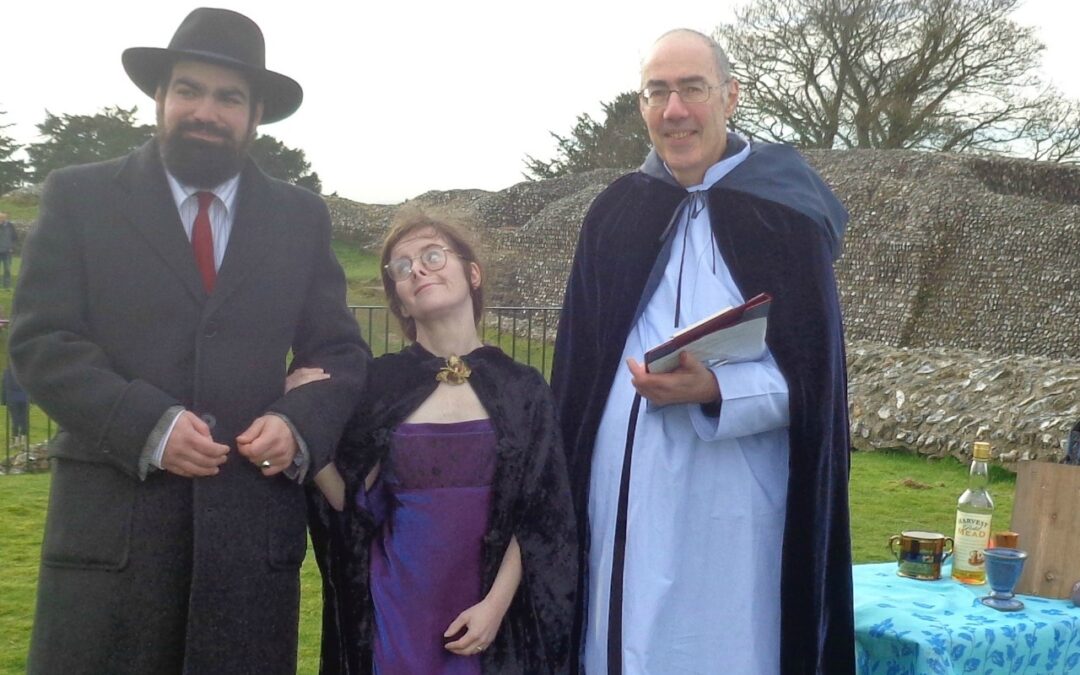
by Michael | Apr 9, 2024 | Blog
It’s normal enough to feel the worse for nerves on your wedding day. Or on any big occasion.
It’s not a bad thing in moderation. In fact, a bit of adrenaline doesn’t hurt at all.
However, you don’t want wedding day nerves that spoil your day. Or even the run-up.
So, what can you do, if you think you’ll be likely to suffer with too many butterflies?
There are tricks you can employ and/or you can accept help.
Techniques
One of the most reassuring things is knowing you are surrounded by trusted professionals. This applies, no matter how many professionals you employ. By that I mean planners, photographers, celebrants, florists, make-up artists, caterers, musicians, etc. etc.
If you have chosen these professionals with care, you know you can rely on them. They will provide a good service and won’t let you down, if something actually does go wrong.
But you can help yourself too.
Firstly, if you have prepared properly for your event (using experienced professionals), let go of the fear and worry. You’ve done all you can to prepare; now it’s down to others to do their job. There’s no point going over in your head what could go wrong. In truth, anything can happen – but it probably won’t! So don’t go looking for trouble, when there probably won’t be any.
If the worst comes to the worst, and something does go wrong, people are usually forgiving, especially if you’ve obviously tried your best.
If the thought of being in the public eye is too much for you, there are people that can help with phobias. I am particularly thinking of Isobel. Her website is www.intherighthands.co.uk, and she has helped a lot of people significantly. She’ll be happy to talk with you.
Remember, come what may, that the vast majority – if not all – of the people at your wedding will be batting for you. Just go out there and enjoy your day!
Feel free to discuss any points this may have raised.
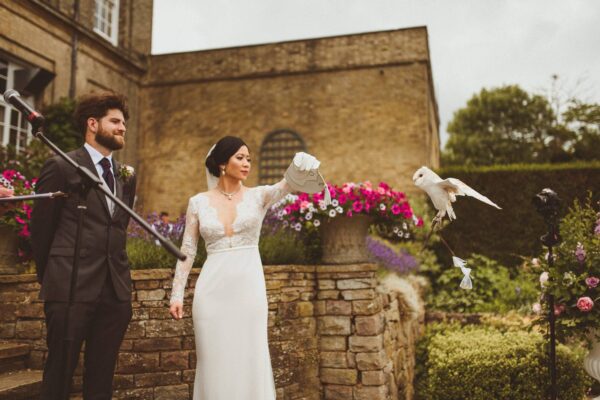
by Michael | Jun 20, 2023 | Blog
It can be dangerous to cut corners when planning weddings. However, it is not always necessary to “go the whole hog”. You can make savings.
Clearly, there are going to be differences between a society wedding and one with a dozen guests. Then there are destination weddings and back garden affairs. I won’t attempt to cover all of these here!
What I am suggesting is some short cuts that, if administered judiciously, should be safe and convenient – and save you some money!
Venue
At one extreme, you can (as indicated) hold a ceremony in your back garden. However, everything – including health and safety aspects – is down to you. You certainly won’t get the peace of mind a hotel (say) should offer you.
If booking a venue, you may be able to barter a little, especially if you’re happy to go out of season with your event. Summer is likely to be most expensive. Arranging your do earlier in the day may work out cheaper.
Wedding Planner
If you’re having a small wedding (especially if you’re using a venue with its own event planner), you may not need a wedding planner as well. Otherwise, I would suggest you at least consider using one.
Planners have contacts across the industry and may actually be able to save you money on suppliers. They take the worry out of the planning and running of the day, which can be invaluable.
You can usually choose either to book a planner for the whole process or simply book one for the day.
Catering
With a small event, you may be able to get away with organising this aspect yourself. But bear in mind that you will have to consider buying in the food and drink, setting up the seating, providing crockery and cutlery etc., heating (if appropriate) and serving the food (safely). Then you may need to cater for those with special dietary requirements (vegans, gluten-free, children, and so on).What about the clearing up?
Having the event professionally catered will not necessarily cost much more than doing it yourself, but will be a weight off your mind (and feet!).
Entertainment
This is down to you! Do you want a disco (but will elderly guests?!)? Do you want a DJ or MC? What about photo booths? A magician, perhaps?
Or none of them?!
Officiant
If you know someone who is a good public-speaker, could they take the service? You may be able to save some money that way. True, they may not be good at putting a memorable ceremony together, but they are a possibility, though not one I recommend.
However, a professional (like myself!) will put a lot of work in to ensure that the ceremony is unique and just what you want. Then, with their demeanour, professionalism and experience, they will virtually guarantee a truly memorable ceremony. You will be able to relax, confident in their ability, and that’s worth a lot.
Musicians and Florists
Live music is usually better for atmosphere, but may well cost more that a DJ.
In-season flowers will probably cost less than more exotic ones. You may choose to go easy on more expansive (and expensive) colour themes, if you want to cut a corner.
Photographers/Videographers
Not something I would skimp on. Those memories are irreplaceable. What if you got a friend to take the photos, and they made a mistake and couldn’t take any? Apart from the loss of tangible memories, would the relationship with that friend endure?
So splash out for these (although there are cheaper ones who are still very good).
Extras
I haven’t talked about rings, clothes or make-up artists, for example, which are probably de rigueur, as far as requirements go.
But there are other extras that you could avoid, if on a tight budget. Lovely as it was, having a barn owl deliver the ring for blessing, did not come cheap. Was it really necessary?
Well, it depends on your viewpoint and pockets.
For more advice, feel free to contact me, but I hope that this was a useful start.
Photo: Matt Penberthy
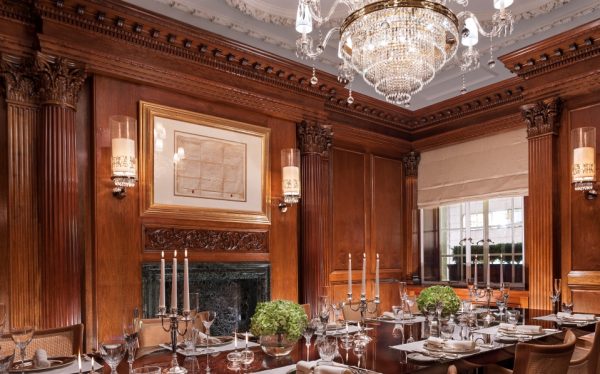
by Michael | May 19, 2023 | Blog
You don’t need me to tell you that weddings are costly. There are potentially a lot of suppliers to engage and they do not tend to come cheaply!
Some suppliers are probably guilty of hoicking their prices up as soon as they scent an engaged couple.
Mind you, mainly due to competition, some charge very reasonable rates. And others undervalue themselves. Not just anyone can do their work! They have been trained, possess specialist knowledge, particular skills and ability. All that needs to be reckoned with too.
Furthermore, what is a necessity to one couple might be a luxury to another, so there will be different viewpoints about how much is reasonable to spend. Of course, the scale and complexity of the ceremony need to be factored in too.
Then there’s the need for the couple to do their ‘due diligence’, shop around and check they’re not being shafted. But they have to take care to compare like with like.
Practicalities
You’re likely to want to hire a photographer, a florist and maybe a celebrant. Then there’s the catering, venue hire, dress/suit outlay, MUA expense, maybe a wedding planner – to name but half a dozen potential expenses.
Even that is not as simple as it sounds.
Do you want a single photographer or a couple, to capture different angles and facets? What about a videographer, or both? Can you get a friend to do the photography? (I’d say no, unless they are professionals themselves. You don’t want a foul-up at such a unique occasion.)
A wedding planner can be a long-term booking, or you can get one for the day only.
A decent celebrant needs to be able to ask the right questions (to get inside the couple’s heads and establish their vision). They also need to listen well (not just imposing their own choices, although advice can often be invaluable). They must be good writers when putting together the ceremony and, not least, be able to present well.
I hold a Diploma in Wedding Celebrancy and have over 10 years’ experience in conducting ceremonies. I belong to an ethical professional association. I have a suitable personality – calm, friendly, but professional. How many celebrants boast all these assets?
I therefore feel justified in charging for my services (although I am only mid-range).
The same must go for other suppliers. They may use other skills, but they are professionals in their field. Many are experts and can guarantee doing an excellent job.
When you’re seeking out suppliers, ensure you find out their Ts & Cs (I know it’s boring!). That way, there can be no nasty surprises, and you’ll know exactly what you’re getting.
And what you’re not!
So, decide your budget, speak to suppliers and choose your team for the event. Hopefully, you can afford the team you want (if not, maybe you can juggle your outlay).
That way, you should get maximum peace of mind and a wonderfully successful occasion!
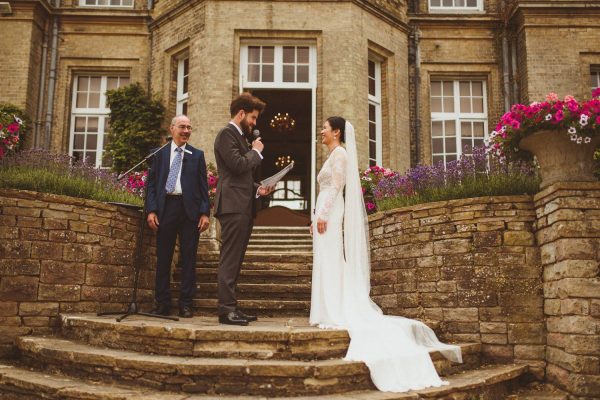
by Michael | Mar 28, 2023 | Blog
Well, of course, you need to define what you consider luxury.
Cons
There aren’t really too many cons, in truth. The bottom line is that you can have a ceremony without a celebrant. If it’s a wedding, you can go down the Church or Register Office routes. They cover everything.
If a ceremony doesn’t need official documentation, technically anybody can conduct the ceremony. So you can ask a friend or relative to do so.
Therefore, technically, using a celebrant is indeed a luxury.
Pros
To despatch the second objection first, if you’re not using a professional celebrant, you may not get the ceremony you are hoping for. It may be difficult to design a suitable service without the guidance and ideas of a celebrant. Moreover, a celebrant knows how to present in public, and will do a lovely job. They will enhance the ceremony.
The first objection is a matter of choice.
You can opt for a religious ceremony (Church). You get the standard service and you know what you’re getting. It won’t be personalised, but that’s fine for some people.
The Register Office service is also standardised. It won’t really be personalised and, in contrast to the religious ceremony, it will be totally secular. You can’t mention God at all, for example. Most Registrars haven’t been trained to present with panache, so the service, which lasts about a quarter of an hour, is rarely particularly special. However, some couples are content with this.
Of course, until such time as the law changes (which should happen this summer), you need to use one of the two above options to comply with the law.
So, in that respect, using a civil celebrant would almost be duplication.
However, the professional services of a celebrant normally include the following:
- The chance to discuss your vision of your ceremony and build a unique service
- Advice and ideas based on (possibly) years of experience
- Respect for your input
- Numerous conversations/emails and drafts to get the order of service just right
- Help with the choreography of a big event
- A trained public speaker
- Professional pride and passion
One of my USPs is that I offer knowledge of languages (French, German, Russian, ability to read Hebrew and Czech), which has proved useful and popular.
Costs
Some celebrants’ package will cost over £1,000. Some will ask half that. (As I write, I’m somewhere in between.)
I would love the chance to make a real difference to your special day.Do contact me for a non-obligation chat.
People who use me are convinced that I am not a luxury!
Evidence
Let me finish with a quote from just one of my happy couples:
“From our first meeting with Michael we came away feeling very confident we would like to use him for our ceremony. His calming yet assertive demeanour put us at ease and we knew he would blend and adapt to what we had planned very well. Michael injected some fantastic ideas along with some beautiful readings and on the day there wasn’t a dry eye in the room. The whole process was very fluid and professional but always with a smile. We couldn’t recommend him enough.”
photo: Matt Penberthy
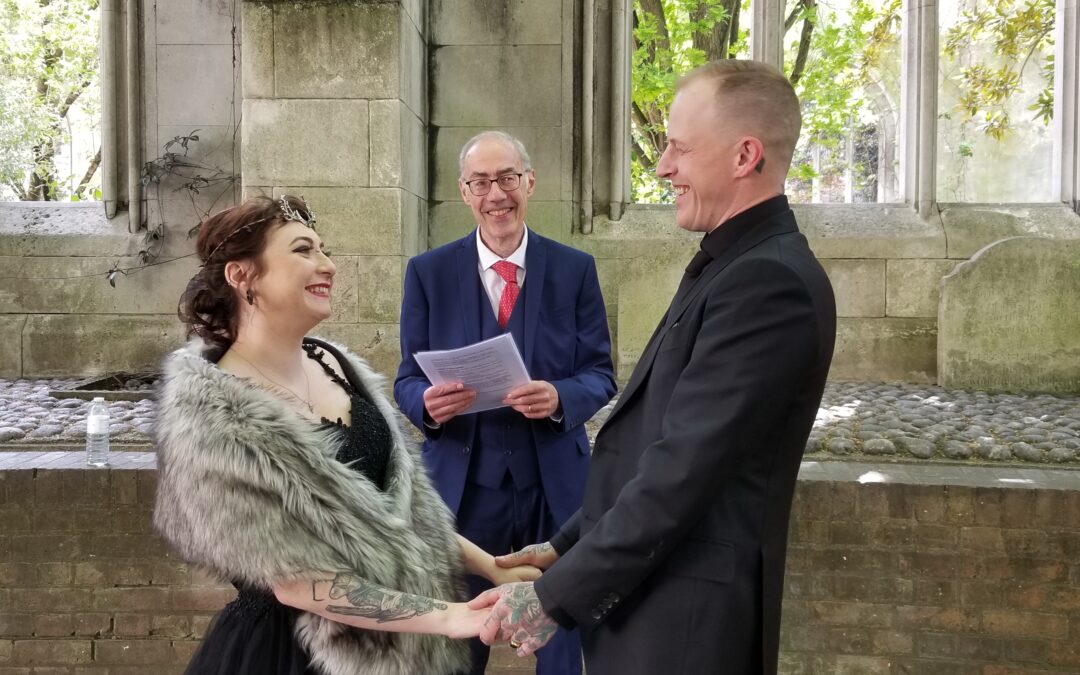
by Michael | Jan 26, 2023 | Blog
There is a certain amount of confusion about who does what at a wedding. Time to sort it out!
Before I launch into this subject, I would like to point out that the roles are not set in stone, and there is no compulsion to use any or all of the roles I discuss. Indeed, just after Lockdown, weddings did take place, but in the simplest way possible.
Bride
In some ways, although she is the star attraction, the bride doesn’t really have to do a great deal. She has to look beautiful and dignified, especially if there is a procession. Otherwise, she has to be careful (particularly if she has a train) while walking, but may not have much else to do at the ceremony.
She may have to recite vows, put a ring on her partner’s finger, and maybe say “I do”. She may sign the certificate, if that happens at that point.
Otherwise, she will be expected to socialise afterwards (and, possibly, give a speech).
Groom
The groom gets away with it for the most part too. He will probably welcome guests as they arrive for the ceremony. He is likely to have a team (Best Man and Ushers) to help him, if he needs it.
Otherwise, apart from vows, saying “I do” and putting the ring on the bride’s finger, he has nothing much to do until giving a speech at the reception.
Best Man
There is a tendency for Best Women to exist nowadays too, but there is almost always a Best Man. His task is to look after the Groom. He will keep him calm and do any jobs that are required (such as communicating with a supplier, or something simple like fetching a glass of water). He will probably look after the couple’s rings until the ring exchange.
His spotlight moment comes at the Reception with his speech, which is often a highlight. He should aim at humour (mainstream, normally!) and embarrass the groom just a bit (not too much!). He should not cause offence to anyone.
Bridesmaids and Ushers
The role of bridesmaids and ushers (also known as Groomsmen) is to support the couple.
The bridesmaids will normally be part of the Procession (and sometimes Recession). They need to follow the cue for entry and restrain themselves from walking too fast!
The ushers may direct guests to their seats and be of general help, for example, they may look after gifts.
Parents
Unless something else has been agreed, the parents will likely be tasked with welcoming guests. It is quite common for the bride’s father to give a very short speech to start the Reception off. He basically says, “Welcome and thank you for coming”.
Officiant
The celebrant should arrive in good time and check that all that is needed for the ceremony is ready. This includes the bride (if accessible) and groom. The officiant can help the Best Man keep the Groom calm.
The celebrant’s role is to take over at the start and direct proceedings efficiently (but with affection, humour and elegance).
Feel free to approach me for more information.





